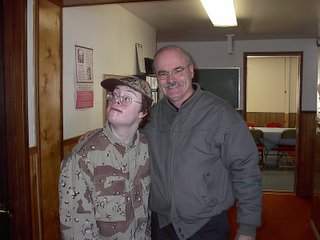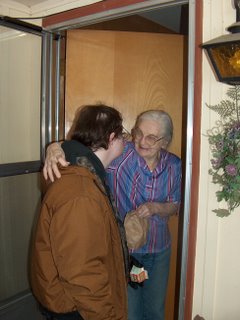Monday, March 13, 2006
The Hard Part - Deciding When to Worry
We have dealt with health issues since the day of his adoptive placement at 15 months old. However, it has been mostly things like ear infections and viral things. He has been blessed with reasonably good health until the last few years.
The documentation system in Parenting Your Complex Child was created mostly to help adapt to Billy Ray’s needs for schedules, environment, and advocating for his needs. It is becoming more important to his medical needs than expressed in my book. We had not experienced this many medical issues at the time I wrote it.
This weekend we had things occurring that could just be the flu. On the other hand, the medical folks have been sort of watching gallbladder since this summer when Billy Ray had surgery for appenditius. I am always left wondering if this is something routine (cold, flu) or should I call the clinic.
I am so thankful that we have Brice Stanley, PA-C, as Billy Ray’s medical provider, because he doesn’t treat me as a worry wart. I know that he will explain things to me and that he will be very thorough with checking things out.
My husband keeps saying what we need is a computer system to hook Billy Ray up to – like they do cars. Then the computer would tell us when Billy Ray can’t what is going on with him. Any inventors out there?
Until next time,
Peggy Lou Morgan
Parenting Your Complex Child YahooGroups List
http://www.parentingyourcomplexchild.com/
http://www.lighthouseparents.com/
Thursday, February 2, 2006
Doctor-Patient Relationships and Documentation
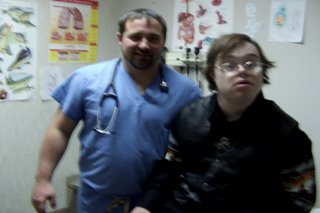
I felt really affirmed by Billy Ray's medical provider, Brice Stanley, recently.
Yesterday he came in just before seeing Billy Ray to get a business card to give to another parent. It made me feel good to think he values the documentation methods so much he would suggest them to other parents.
Additionally, in a recent email he made comments about my documents which I think support the benefit of doing them. I also think they say a lot about Brice as a person and as a medical provider. I am sharing them here with his permission.
"I am excited to see** your son. Why? Because... despite the enormous challenge he presents each and every visit I find a unequalled satisfaction in seeing him trust me. I feel content to see your well-done behavioral logs that make my job so much easier. I also have a strange satisfaction in knowing that we have made some difference in his perception of daily quality of life when he smiles in the exam room."
"Each day that I see Billy I learn something new. A better way to communicate, or a more intuitive way to observe his behavior, or how important it is to read reports you bring. Each of these things presents a new challenge and satisfaction in my career. I look forward to seeing him because I get to partake in his well-being and LEARN at the same time."
In prior posts we have discussed the importance of the relationship with your child's medical provider. See Trusting Your Gut and Doctor-Parent Relationships and Developing the Right Doctor.
Until tomorrow,
Peggy Lou Morgan
Wednesday, February 1, 2006
Why Journal
I love the theme of this years Arc of Oregon conference “Get Real”. When I started writing my book I thought about calling it The Real World Your Child Lives In. Expectations of help and services can be very different from reality. Just because there are laws that grant services to your child doesn’t mean your child will get those services.
The U.S. Congress created the Americans with Disabilities Act (“ADA”) and the Individuals with Disabilities Education Act (“IDEA”). They did not necessarily fund the programs sufficiently to provide the services they mandate. A child must be proven eligible for specific services as well as able to benefit from a service.
In Doing Your Own Clinical Trials we quoted Kate Crow, Genetic Counselor from foreword to Parenting Your Complex Child (April 2006) that medical researchers don’t do many studies on “complex children”. We also shared that when asking several medical schools how much training on special needs patients medical students received the phrase “touched on lightly” was a frequent answer.
How do we wade through the frustration of getting help for our children. I will share my struggle and the approaches I created in detail in Parenting Your Complex Child. For now I want to share you with you the foundation of my system so that you can get a head start.
The foundation is the journal. It will include the quick notes – sometimes only one of two words to jog your memory because you are too busy to write much when your child is in a meltdown or you are involved in something else with him. Other times you will note observations in more detail when you are able to write.
It is like your study notes for a class in school. Your child is your professional and you are taking notes from his presentation. Because it is for your eyes only you can do it however you need to. The data gleaned from your journal can be used to demonstrate your child’s needs in documents for medical, educational, and governmental professionals. It can also be used for transitional planning and estate planning documents.
I like to say the journal is the detail. Presenting the journal itself to the busy professional does not work because it is too long for them to read in a short appointment. I create documents from Billy Ray’s journal that are in a format a busy doctor, for example, can absorb in short visits. I take the journal along so that if he or she has more specific questions than given in the summaries I provide we can refer to the journal for more detail.
The journal can be in any format that works for you. Billy Ray has a computer in his room and it is the one thing he doesn’t throw. He enjoys the screensaver pictures of his activities, family members and friends, etc. thus he is protective of “my puter”. I am able to keep the journal minimized on his computer at all times. When I am in his room while he is going to sleep, while he is dressing or other activities in his room, I am can make quick notes.
What to put in your journal depends on your child’s needs. If sleep is an issue track the naps and night sleep. If he suffers from constipation, etc. you could track bowel movements. Note any issues that a professional is likely to ask you about later.
Behavior issues are helped a lot by the journal. It will enable you to catch “triggers”. Note what was happened before a behavior, what the behavior actually looked like and how it was resolved. When you review the journal later you are able to see that if something was happening (for example, noise or unexpected visitors) it routinely triggers a behavioral. It will help you to avoid triggers to the degree possible and reduce some of the negative behaviors that result.
In a very real way you become the eyes and ears to help professionals understand and treat your child. In a recent email from Billy Ray’s medical provider he mentioned the importance of the documents I bring. I will share those with you tomorrow and hopefully get of a picture of Billy Ray and “my Dr. Brice” when he sees him this afternoon.
Until tomorrow,
Peggy Lou Morgan
http://www.parentingyourcomplexchild.com/
http://www.lighthouseparents.com/
Tuesday, January 24, 2006
Being the Eyes and Ears for Your Complex Special Needs Child
This time I mentioned the comment to my son’s case manager. I asked him if he didn’t agree with me that most parents really try hard to meet their child’s needs even the most complicated ones. He said “not everyone is able to be the eyes and ears.” While I think most parents are able to observe their kiddos better than anyone, it was like one of those lights going off moments.
I thought about the documentation system and approaches in Parenting Your Complex Child (April 2006). That is exactly what it does – acts as the eyes and ears to help interpret our children.
It didn’t start out to be a book. I just grew frustrated with not being able to get adequate help for Billy Ray or even fully understanding him myself. Nothing was working. I felt like medications were being thrown at Billy Ray without the doctors really understanding him. He was being forced into programs that didn’t work for him instead of creating systems that did work for him.
The first turning point was in practicing the lighthouse concept that I have shared with you before. The next was taking past experience as a paralegal and a professional fiduciary, applying them to create a documentation system so that doctors, educators, and social work would see Billy Ray as he really is.
Documentation seems overwhelming when we living out the stress of taking care of our children. I hope that I have made my system simple enough that parents can use
it to be the eyes and ears to get the information to professionals of all kinds about what their child needs to thrive.
Until tomorrow,
Peggy Lou Morgan
http://www.parentingyourcomplexchild.com/
http://www.lighthouseparents.com/
Friday, January 6, 2006
Helping Our Complex Children to Experience "Normal" Life
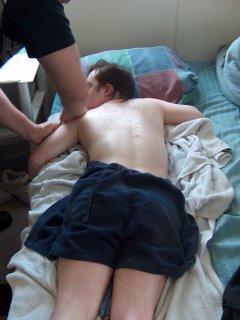
I think of that often in planning for Billy Ray. There are parts of his schedule that I could easily live with such as the full body massage he gets daily with Baby Oil Gel shown in the picture. See Skin Care on my website for details about why gets this royal treatment. This is something that we must do for him.
It is a question that we are parents need to think about in our expectations of our children. Of course, there are things that must be done for their health and safety. For example, now that he is diabetic we can’t allow him to have everything that he wants. If we would allow it he would have 6 milkshakes in a day. We limit it to two made with skim milk, no sugar ice cream and sugar free strawberry jelly since we can’t find sugar free syrup like the regular syrup we used to use.
To the degree possible we have to allow them to have choices. Some Autistic or complex special needs children can make choices from two or three things. Some cannot. Billy Ray can sometimes and sometimes not. We do free choice visuals or use his picture symbols which aid in his choices but sometimes he is not able to do it that way either.

At the same time there are things about life that we all have to experience. It seems important to allow our kids to experience many of the things that are just part of life as possible. For example, when we eat we have to wash dishes. The floors have to be vacuumed and our bed made. Some special needs kids may not be able to do all of the normal things of life but I think we have to involve them in whatever they are able to do. It is definitely easier to just do dishes than involve Billy Ray in the task but it doesn't allow him to experience normal life if I do. It is just part of life and it helps them to feel better about themselves. In the picture he is unloading the dishwasher with consultant and friend, Keddie Wanless who was assisting with staff training.
Some may not agree but I think we have to allow our children to live with the consequences of their choices when possible. Billy Ray sometimes detours from his plan for the day by wanting something else just as it is time to go out for his community activity. Yesterday he wanted Ron to make him a hamburger. We had to tell him if he made that choice he would not be able to do lunch at a certain restaurant he does every Thursday. Of course, he wanted both.
I was thinking about the difference in the consequences we as parents experience and those we allow our complex children to experience. Yesterday I dropped a coffee cup and broke it. I had to clean it up and feel the disappointment of losing a favorite cup. Billy Ray recently threw his milk and started a chain of events that ended up with lots of broken glass and food all over the floor. We are cautious not to make a big deal of it for Billy Ray because he feels so guilty about his behavior that he can actually escalate more from the guilt. We don’t need to guilt trip him about behaviors that come out of impulse control issues, confusion or frustration. At the same time just as the rest of us experience in our lives there are consequences. We drop something, it breaks, we clean it up. It doesn’t need to be punishment just normal consequences of things that happen or our choices. To the degree possible, we can allow our children to experience natural consequences of life that we all face without harming them. They can grow from the consequences of life just as we parents do.
I agree with Dan that we should consider the lives we expect our children to live in terms. Some disabled children are kept in front of the television all day or expected to work in production lines which would be intolerable for some of us. We need to consider that constantly. At the same time, we need to allow our children to experience life even when it can be the pits for us all.
Until tomorrow,
Peggy Lou Morgan
http://www.parentingyourcomplexchild.com/
http://www.lighthouseparents.com/
Thursday, December 29, 2005
Update on Regrouping
The documentation system to get the doctor a clear picture of what Billy Ray was experiencing helped a lot. New medication was added. It was bumpy at first and necessary to have repeated conversations with the psychiatrist. However, we have made significant progress in that regard.
It is easy when you are already tired that the visuals and documentation are not important now. In the past few days it has become more obviously that a combination of medical and psychiatric interventions with the things we do at home (visuals, schedules, routines and community activities) is the only way to create a life that works for us. Consistency is so important. Once the schedules and visuals are done there is training of support staff and family so that everyone involved with Billy Ray does things the same way.
Last night Billy Ray was moderately manic (silliness, laughing and active). I was thinking how nice it is to be back to his old self. This is more normal for him. So much better than the sound of breaking glass and furniture being knocked over. It felt so good, I just went with his mania (took his hands and bounced up and down with him for a minute).
As I have been recreating visuals and schedules for Billy Ray in the past few weeks we have snapped a lot of pictures. They aren't family portraits by any means. Nevertheless, sometimes you get shots that show who he is as a person and give insight into his life and relationships. Just for fun I'll share some of them with you.
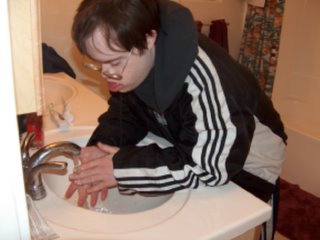 These pictures are everyday events that wouldn't seem significant unless you know the circumstance surrounding the task. I love the intense way Billy Ray is washing his hands in this picture (taken to make a symbols for wash hands) because we have worked hard to get him to do a thorough job allowing warmer water because he has a tenancy to scratch which adds to his infections issues and because he now has to have the finger stick blood sugars done daily. The scrambling eggs picture is from a visual I did so that support staff knows the sequence required for Billy Ray to make his breakfast.
These pictures are everyday events that wouldn't seem significant unless you know the circumstance surrounding the task. I love the intense way Billy Ray is washing his hands in this picture (taken to make a symbols for wash hands) because we have worked hard to get him to do a thorough job allowing warmer water because he has a tenancy to scratch which adds to his infections issues and because he now has to have the finger stick blood sugars done daily. The scrambling eggs picture is from a visual I did so that support staff knows the sequence required for Billy Ray to make his breakfast. This is Billy Ray with Pastor Richard Lighthill at Grace Fellowship. He goes on Tuesdays and Thursdays to do a few chores that he enjoys doing similar to the ones he did at the School District Office when he was still in school.
A highlight of these community activities is greeting anyone and everyone at the church. He literally interprets the Men's Bible Study on Tuesday mornings. I told staff to stop allowing him to interrupt but was quickly put in my place by the men in the group. Somedays Billy Ray will shake hands around the table and other times he hugs everyone. His "my men" love it.
On Wednesday Billy Ray and his support staff deliver meals on wheels through the Senior Center. The picture on the right is with one of the ladies on his route. His people are always glad to see him.
I think we may be on the road back to where we want to be. There is a great deal of satisfaction in knowing that we are adding quality to Billy Ray's life by this planning and enabling him to give back to the community in doing things he loves to do.
I am working on adding pages to my website with more of his visuals and the forms that will be in my book. I will give you links when they are ready.
Hope your holidays are going well and you are having some fun with your children.
Until tomorrow,
Peggy Lou Morgan
Wednesday, December 28, 2005
Your Child's Best Expert..His Parent(s)
When asked what why she wrote her book Making Peace with Autism and what her message was, Susan said that parents needs to trust their gut and recognize that they are their child’s best expert. Exactly!! I said the same thing in my post Doing Your Own Clinical Trials.
We need more public awareness of the reality we live with daily. This is difficult because each of our children are unique. Susan’s Nat is not my Billy Ray or vice versa. Each of us has to evaluate what works for our own child as an individual and create a life that works for the whole family as well as our child with Autism or some other disability.
In the foreword to my book, Parenting Your Complex Child, (April 2006) Kate Crow, Genetic Counselor, says of the book “This book is so much more than a list of suggested responses to particular behaviors. It's a detailed guide to understanding your child and building a place in the world for him or her from the ground up.”
I think that we need to enable parents to build a life for their own child from the ground up. Hopefully those of us who are now sharing our stories with other parents can encourage parents that you can take your rightful place as leader of your child’s team.
Good job, Susan!!
Until tomorrow,
Peggy Lou Morgan
http://www.parentingyourcomplexchild.com/
http://www.lighthouseparents.com/
Saturday, December 10, 2005
Where is this Coming From?
As most of you know, Billy Ray, almost 23 years old, has the dual diagnosis of Down Syndrome and Autism as well as Bipolar and ADHD. Additionally it is believed he has early onset of the Dementia that some Down Syndrome people experience. It usually occurs in the mid thirties but Billy Ray began to show symptoms at 16 two years after a series of major seizures believed to be from a reaction to medication.
The “clinical trials” we have been referring to in the past couple of days make a big difference. For us clinical trials are mostly documentation that we share with his medical and psychiatric professionals. It helps the doctor to see what is happening and make informed recommendations for treatment.
It may also be that his schedule or sensory stimulation needs to be adjusted. I am so grateful to have the journals I have been keeping to look back and glean patterns to help answer the question “where is this coming from?”
Until Monday,
Peggy Lou Morgan
http://www.parentingyourcomplexchild.com/
http://www.ligthhouseparents.com/
Friday, December 9, 2005
Doing Your Own "Clinical Trials"
As Dr. Sanghavi says in the same article “autistic people are like snowflakes: No two are alike, and the clinical spectrum ranges from severe disability to near normalcy.” That is certainly true with only one diagnosis. Adding the dual diagnosis of Down Syndrome and Autism makes the uniqueness even stronger. Each child will manifest the symptoms of each diagnosis differently than if he experienced a single disability. When you add mental illness diagnoses or other medical and developmental disability diagnosis, it really muddies the water.
The late Dr. Ron Roy, Billy Ray’s first pediatric psychiatrist used to say that it would be impossible to cover every possibility in medical school. Combinations of diagnoses change the way any one disability plays out in an individual. In a recent conversation with prominent medical schools, I asked how much training in dealing with developmental disabilities was provided to the average pediatrician (who do not go on to become a developmental pediatrician). I was told that it was “touched on lightly”.
In the Foreword to my upcoming book, Parenting Your Complex Child (April 2006) , Kate Crow, Genetic Counselor writes: “Perhaps the most valuable parts of this book are Ms. Morgan's suggestions for observing and keeping records. Medical researchers don't study many complex children. As health care providers, we depend on the published research to inform us so we may provide advice and guidance to families. If a patient is "complex", and doesn't fit the description of a single condition described in the research literature, we are left with little to share. Teaching parents to observe and problem-solve empowers them to fill in the information gaps for themselves.”
You are the most important expert in your child’s care. Don’t let disrespect for your position or expertise relative to your child defeat that.
I did want to make a side note because I am getting emails when I don’t do Sunday blogs. We do not have support staff on Sundays and I try to do as much Mommie time as possible with Billy Ray. If we are able to go to church (meaning BR is calm and the roads aren’t too icy) I can’t get to the blog until late afternoon. If he is having a bad day I might not get it done at all. Thus, I am suspending Sunday blogs at least for now.
Until tomorrow,
Peggy Lou Morgan
http://www.parentingyourcomplexchild.com/
http://www.lighthouseparents.com/
Thursday, December 8, 2005
Our Children are like Snowflakes...Unique
Dr. Sanghavi’s comment “AUTISM FRIGHTENS PARENTS more than almost any disorder, since it implies that the child can never function independently in society and may never fully reciprocate, or ever fully appreciate, the expressions of love” which “got under my [Susan’s] skin also bothered me.
Any diagnosis is frightening if you don’t know what it means. For example, when Billy Ray was diagnosed with pediatric bipolar the psychiatrist provided me with literature which said that the diagnosis of pediatric bipolar was more undesirable than a diagnosis of cancer. I asked the pediatrician about that statement. She replied that pediatric bipolar will go on and on and treatment is more difficult. Cancer can be cured or will, unfortunately, end at some point. I think many parents may see the diagnosis of Autism similarly because there are so many unknowns.
Susan ends her post with “What we need is more honest and positive accounts of living with autism. Parents need facts that help them strategize and advocate for their kids, not horror stories and hopelessness. They need hugs and encouragement. Autism need not be a death sentence. Our children were not stolen; we just have to look a bit harder to see them.”
I couldn’t agree more. In prior posts herein, we have discussed that the best way parents can support each other is by being open about what we experience. Disabilities have been considered a stigma of sorts and just not talked about unless necessary. Parents are frightened by the diagnosis more because so little is known rather than the disease itself.
After reading Susan’s blog post and going to The Globe to order the article, there were other things that I want to comment about too.
The article by Dr. Sanghavi is basically about the vaccine-autism controversary. He profiles a family whose sons experience Autism, the beliefs they have established and the choices they have made in doing what is best for their sons.
In the same paragraph, that Susan quoted the first sentence (quoted above), Dr. Sanghavi writes: “Though portrayed in the public imagination by characters such as Dustin Hoffman in Rain Man, autistic people are like snowflakes: No two are alike, and the clinical spectrum ranges from severe disability to near normalcy.” Absolutely!!
That is exactly why I wrote Parenting Your Complex Child (AMACOM Books April 2006). I devoured all the literature I could on Autism when Billy Ray first demonstrated symptoms and we finally got the diagnosis. Some books were helpful and some were not. Many told me what I should do for Billy Ray specifically. Those generally didn’t work for us. The ones that helped the most, such as Temple Grandin’s books and articles, told what she experienced. I could then glean information and apply it to help find out what worked for Billy Ray. My book recognizes that all disabled children are unique whether they have complex issues or not. It seemed more helpful to encourage parents in methods for determining what worked for their own child than to tell them what to do because it worked for my son.
Dr. Sanghavi is somewhat critical of the family for performing “their own clinical trials with a study population of two, or sometimes one.” That statement got under my skin more than the one that got to Susan Senator. As Dr. Sanghavi acknowledges there are not many larger studies to help doctors help parents. To make matters worse developmental disabilities are not taught extensively as a part of medical school. Parents must do their own investigation, sharing results with the doctor involved, of triggers, problem areas and what works for their own “snowflake”.
I don’t know where to come down on the vaccination and dietary issues. I highly respect the work done by Dr. Rimland and Autism Research Institute. I have devoured his materials and tried many of his suggestions. Again, complex children are unique. What works for one may not for another. The fact that they didn’t work for my son at the stage of his life when I learned of such things doesn’t mean they are not good suggestions for your child.
I agree with Susan that Autism is not a death sentence. It is a life changing experience. Nothing will be the same as we expected.
I was reminded of the article “Don’t Mourn for Us” by Jim Sinclair I read years ago and recently found again at http://www.autistics.us/library/dontmourn.html. Mr. Sinclair eloquently makes the point that when we grieve for our child who has Autism we are wishing that we had the child we hoped for (the perfect one that rarely exists) and want the Autistic one to go away. He states that without Autism the child would not be the same person as he is with Autism. According to Mr. Sinclair “Autism is a way of being. It is not possible to separate the person from the autism.”
See my recent post thanking Billy Ray’s birth parents where I compared his life to the classic movie “It’s a Wonderful Life”. Our mission, should we chose to accept it, will change our outlook on everything about life. As we accept our child for who he is and help him do what works best for him including but not limited to medical care, educational and home programs, a quality of life happens that cannot be described fully.
Until tomorrow,
Peggy Lou Morgan
http://www.parentingyourcomplexchild.com/
http://www.lighthouseparents.com/
Monday, December 5, 2005
Documentation is Not a Dirty Word
Billy Ray’s present psychiatrist and I work well together. It is not necessary for me to impress him that I know my son. However, when you are trying to get professionals in various fields to listen to you having this documentation system helps a great deal.
The documentation system I use is contained in Parenting Your Complex Child (AMACOM Books April 2006). When it comes out in April I will put the forms that I created to use for Billy Ray on my parenting website. As I make updates in my system or create new visuals they will be on the website for your use.
Until tomorrow,
Peggy Lou Morgan
http://www.parentingyourcomplexchild.com/
http://www.lighthouseparents.com/
Monday, October 24, 2005
Monday Morning Reflections
He had such a good weekend behaviorwise. This is a good thing but may mean something is changing. Sickness or fear can manifest itself in two ways: especially good behavior and/or aggression. When his behavior changes there is caution about why.
This is more frightening because this summer he had two surgeries in 47 hours and ended up on the ventilator for 9 days in the Critical Care Unit. Knowing his past difficulty with recovering much less serious illness it seemed unlikely he would recover. However, thanks to Dr. Mike Masterangelo, Dr. Harliss and Dr. Jacobs and a lot of prayers he came back better than I ever dreamed possible.
Dr. Masterangelo kept me hanging in there when I wanted to give up. Reflecting on that this morning I realize we wouldn't have had the wonderful day together that we had yesterday if it were for Dr. Mike and his helpers.
I am thinking about the post I wrote a couple of days ago relative to planning for adulthood and the time I can no longer take care of Billy Ray. Because it is my birthday today I am reflecting on his care if I am not here. I am more confident because of the documentation system but there is always the nagging questions.
Time for a second cup of coffee.
Until tomorrow,
Peggy
www.parentingyourcomplexchild.com
www.lighthouseparents.com

